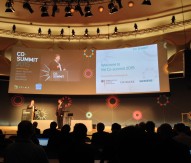
Glasgow secures money for wireless broadband breakthrough
The University of Glasgow has secured funding under Horizon 2020 for the development of an ultra-fast wireless data transfer.
The UK university is heading the international project consortium ‘Innovative ultra-BROadband ubiquitous Wireless communications through terahertz transceivers’ (iBROW), which has received €4m in funding from the European Commission. The group will investigate the opportunities of resonant tunnelling diode (RTDs) technology to create ultra-broadband wireless communications over the next three years and includes academics and private sector partners from France, Germany and Portugal.
Speaking about the project, Dr Edward Wasige, senior lecturer in electronic and nanoscale engineering at the University of Glasgow, said: “RTDs are pure solid-state electronic devices operating at room temperature with reported working frequencies exceeding 1THz. They have the potential to create wireless broadband systems at frequencies where other electronic semiconductor devices cannot be used, and could allow wireless data transfer rates of up to 100Gbps in the long term.
“We’ll be working to increase RTD output power and optical detection efficiency with reduced energy consumption, through development of a low cost and energy efficient unified technology which can be integrated into wireless devices such as tablets and mobile phones, as well as the base stations these devices communicate with.”
Wireless broadband technology is struggling to keep up with the breakthroughs in wired technology. By 2020, it is estimated that speeds in the range of tens of Gbps per second will be required, a path not currently possible using the frequency spectrum of current wireless systems and therefore causing data bottlenecks.






